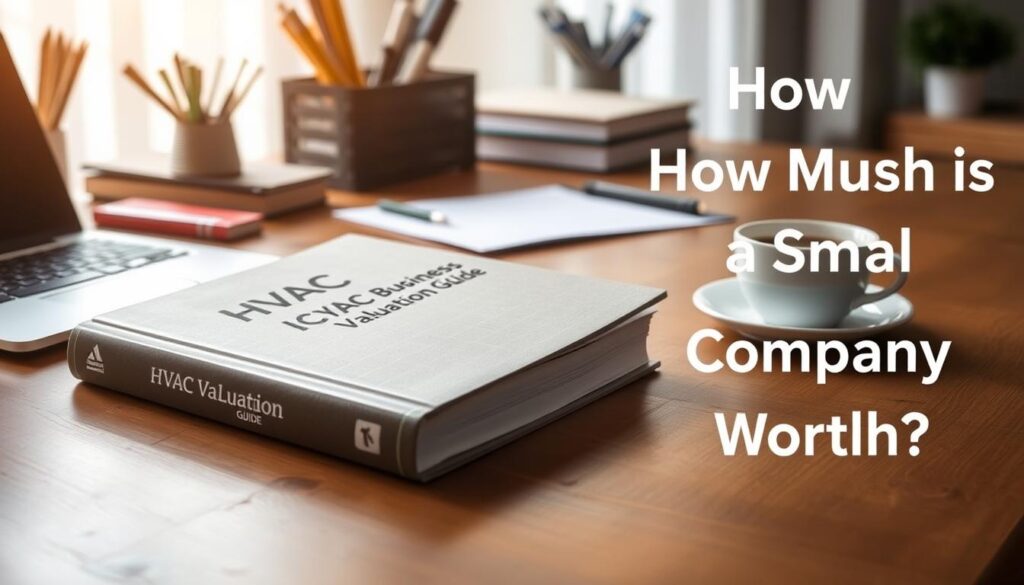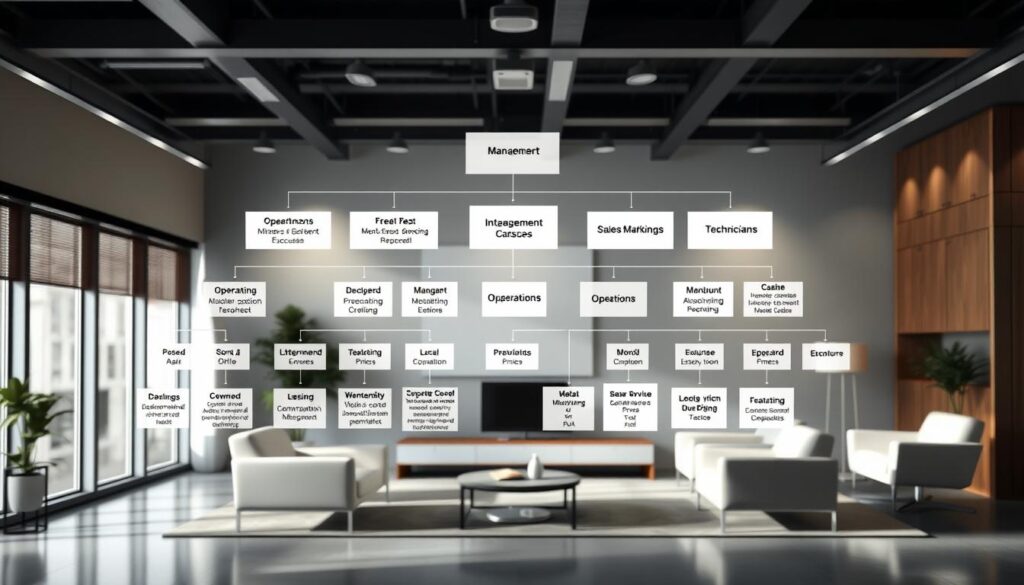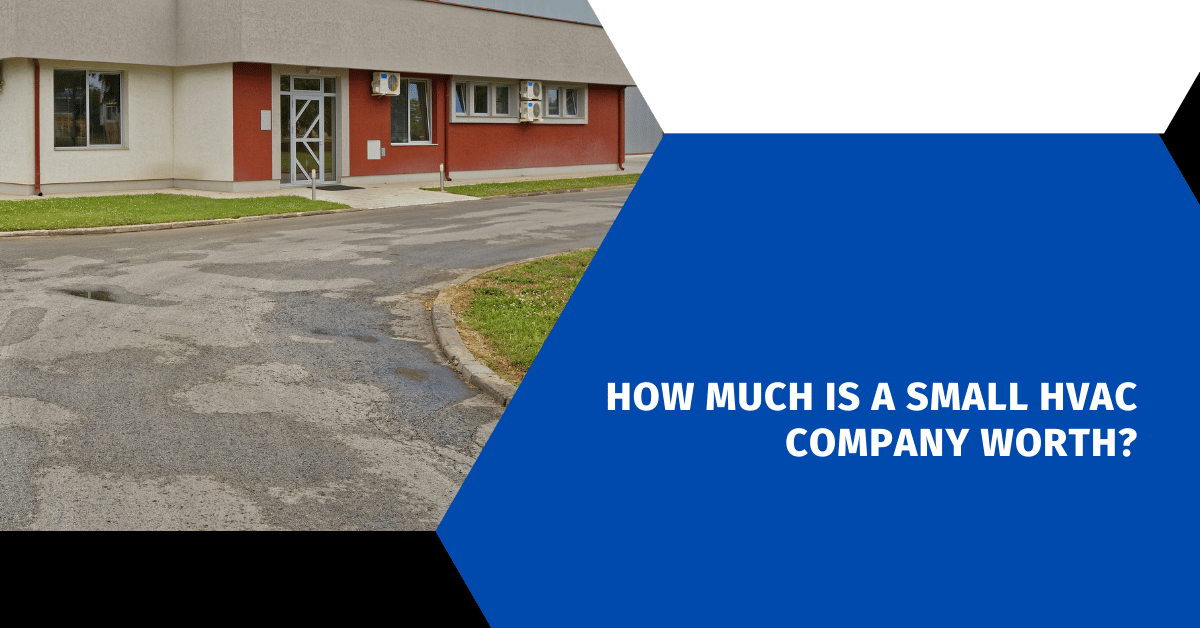Affiliate Disclosure
HVAC Guide Guys is a participant in the Amazon Services LLC Associates Program, an affiliate advertising program designed to provide a means for sites to earn advertising fees by advertising and linking to Amazon.
How Much is a Small HVAC Company Worth? Ever thought about what your HVAC business could sell for today? Knowing your company’s true value is more than just numbers. It’s about seeing the hidden opportunities and growth within your business.

Valuing an HVAC business is complex, not just about money. Private equity firms and buyers are looking for well-run HVAC companies. So, it’s key to know how much your small HVAC company is worth.
Your business is more than just equipment and services. It’s a valuable asset that can bring big financial gains with the right evaluation. Whether you’re planning to retire, looking for an exit strategy, or just want to know your company’s worth, understanding HVAC business valuation is vital.
Key Takeaways
- HVAC business valuation involves multiple financial metrics
- Understanding your company’s worth helps strategic planning
- Multiple factors influence HVAC business value
- Private equity interest is growing in the HVAC sector
- Proper valuation requires a deep financial analysis
Table of Contents
Understanding HVAC Business Valuation Basics
When figuring out the worth of an HVAC company, owners must grasp key financial metrics. The value of your HVAC business is influenced by more than just sales figures.
Valuing an HVAC business means looking at many financial and operational details. Buyers and investors dive deep to see your business’s real worth.
The Role of EBITDA in Valuation
EBITDA (Earnings Before Interest, Taxes, Depreciation, and Amortization) is key in figuring out an HVAC company’s worth. It shows how well your business operates by:
- Measuring pure operational profitability
- Removing financial and accounting complexities
- Allowing direct comparison between different HVAC businesses
Importance of Financial Performance Metrics
Investors look at several financial metrics to judge your HVAC business’s worth. Important ones include:
| Metric | Significance | Impact on Valuation |
|---|---|---|
| Gross Profit Margin | Operational Efficiency | High margins increase business value |
| Customer Retention Rate | Business Stability | Strong retention boosts valuation |
| Annual Revenue Growth | Business Growth | Consistent growth attracts investors |
Common Valuation Methods
HVAC businesses use three main ways to value themselves:
- Multiple of Earnings Method: Multiplying annual earnings by an industry-specific factor
- Asset-Based Valuation: Calculating total value of tangible and intangible assets
- Discounted Cash Flow: Projecting future cash flows and determining present value
Knowing these basics helps you make your HVAC business more attractive to buyers.
How Much is a Small HVAC Company Worth?
Finding out how much a small HVAC company is worth can be tricky. The value of a small HVAC business depends on many important factors. These factors greatly affect its market value.
Small HVAC companies making less than $1 million a year usually get valued between 2.75 to 3.25 times their SDE. The exact value depends on several key things:
- Annual revenue volume
- Profitability margins
- Customer base stability
- Operational efficiency
- Market positioning
Investors and buyers don’t just look at money when valuing small HVAC businesses. They also consider the business’s growth chances, client ties, and its edge in the local market.
| Revenue Range | Typical Valuation Multiple | Potential Sale Price |
|---|---|---|
| $250,000 – $500,000 | 2.75 – 3.0 | $687,500 – $1,500,000 |
| $500,000 – $1,000,000 | 3.0 – 3.25 | $1,500,000 – $3,250,000 |
Getting your HVAC business valued by pros can give you a clear idea of its worth. They help match what you think your business is worth with what the market says it’s worth. This way, you get a fair price for your business.
Explore Our HVAC Shop
Looking for top-rated HVAC tools, parts, and accessories? Visit our shop and find the perfect solution for your needs.
Visit the ShopKey Factors Affecting HVAC Business Value
Knowing what makes your HVAC contractor business valuable is key. Every choice you make affects your business’s worth. This includes how you run your operations and manage your assets.
Many important factors influence your HVAC firm’s market value. Smart business owners know planning is more than just daily tasks.
Market Position and Competitive Landscape
Your place in the local market affects your business’s value. Buyers look at your strengths:
- Unique service offerings
- Geographic market coverage
- Reputation within the industry
- Years of established presence
Customer Base and Revenue Streams
A strong and varied customer base boosts your business’s value. Investors look for:
- Consistent recurring revenue
- Long-term maintenance contracts
- Diverse client mix (residential and commercial)
- High customer retention rates
Equipment and Asset Quality
The state and age of your equipment matter a lot. Buyers check:
- Current technological capabilities
- Maintenance records
- Age and replacement value of tools
- Inventory management practices
Good asset management can really up your business’s appeal and value.
Calculating Seller’s Discretionary Earnings (SDE)
Understanding Seller’s Discretionary Earnings (SDE) is key for a good hvac business valuation. SDE shows your HVAC company’s real earning power by adjusting net profit with certain financial factors.
To estimate your hvac company’s worth, you’ll add back some expenses to net profit. This makes it easier for buyers to see your business’s true financial health.
- Owner’s salary and personal compensation
- Non-recurring business expenses
- Depreciation and amortization
- One-time equipment purchases
- Personal insurance and vehicle expenses
The SDE calculation is great for small to medium-sized HVAC businesses. It’s better than EBITDA for them.
Here’s a simple SDE calculation example:
- Start with net profit
- Add back owner’s salary
- Include non-recurring expenses
- Subtract standard business expenses
- Determine final SDE value
By documenting and calculating your SDE well, you give buyers a clear look at your HVAC business’s financial health and earning power.
Explore Our HVAC Shop
Looking for top-rated HVAC tools, parts, and accessories? Visit our shop and find the perfect solution for your needs.
Visit the ShopUnderstanding HVAC Business Multipliers
When you sell your HVAC firm, multipliers are key to figuring out its worth. These numbers help buyers and sellers see the real value of an HVAC business. It’s more than just looking at financial reports.
Multipliers are a way to value a business by using a certain factor to its financial performance. For HVAC companies, these factors usually range from 2.75 to 4. This depends on several important factors.
Revenue-Based Multipliers
When figuring out your business’s value, multipliers look at a few key things:
- Annual revenue volume
- Profit margins
- Business stability
- Growth possibilities
Industry-Specific Considerations
The worth of your HVAC business can change based on the industry:
| Factor | Impact on Multiplier |
|---|---|
| Residential vs Commercial Mix | More commercial work raises the value |
| Service to Installation Ratio | More service revenue increases the multiplier |
| Technological Infrastructure | Advanced tech makes the business more attractive |
Geographic Location Impact
The price of your HVAC firm can change a lot based on where it’s located. Places with extreme weather or fast economic growth often have higher demand for HVAC services. This means higher multipliers.
“Location, location, location isn’t just for real estate – it’s critical in HVAC business valuation.” – Industry Expert
Knowing about these multipliers helps you set your HVAC business up for the best sale price. It’s all about strategic positioning.
The Impact of Business Structure on Valuation

Your HVAC company’s structure is key to its sale value. A well-organized business draws in buyers and gets a higher price.
Building a strong business framework includes several important steps. These steps affect your hvac contractor business value:
- Implementing clear operational processes
- Developing systematic inventory management
- Maintaining organized financial documentation
- Utilizing advanced technological solutions
Professional groups like CEO Warrior and Nexstar can help improve your business structure. They offer advice on standardizing operations. This makes your company more attractive to buyers.
“A well-organized HVAC business is not just about current performance, but about creating a scalable and attractive enterprise for future investors.”
Customer relationship management (CRM) systems are also vital. They help manage client interactions and show your business’s sophistication to buyers.
Investing in good processes, technology, and networking can greatly boost your HVAC company’s value. It makes your business more appealing to buyers.
Explore Our HVAC Shop
Looking for top-rated HVAC tools, parts, and accessories? Visit our shop and find the perfect solution for your needs.
Visit the ShopMaximizing Your HVAC Company’s Worth
To increase your HVAC business’s value, you need a solid plan. Focus on key areas to boost your business’s worth. This will attract buyers or investors.
Strategic steps can turn your HVAC business into a top choice. Let’s look at ways to increase your company’s value.
Streamlining Operational Efficiency
Being operationally excellent makes your business more appealing. Here are some tips:
- Use digital tools to manage your workflow
- Streamline processes and cut waste
- Train your employees to improve skills
- Automate tasks to save time
Cultivating Strong Customer Relationships
Your customers are a key part of your business’s value. Build strong connections with them through:
- Clear communication
- Custom service packages
- A feedback system
- Loyalty programs and maintenance contracts
Generating Recurring Revenue Streams
Having steady income boosts your business’s value. Focus on:
- Preventative maintenance plans
- Monthly service subscriptions
- Extended warranties
- Energy efficiency advice
Improving these areas makes your HVAC business more valuable. It will stand out in the market.
Role of Professional Valuation Services

Professional valuation services can change the game when you’re figuring out your small HVAC operation’s worth. These experts have deep knowledge and tools to really get what your business is worth.
They know the HVAC industry inside out. They look beyond just the numbers to see what really matters for your business’s value.
- Comprehensive financial analysis
- Industry-specific market comparisons
- Detailed equipment and asset evaluation
- Competitive landscape assessment
The right valuation pro can help you:
- Get ready for selling your business
- Get the right financing
- Plan for growth
- See your business’s true possibilities
When picking a valuation expert, look for HVAC experience. Credentials, track record, and specialized knowledge are key.
| Valuation Service Characteristics | Key Benefits |
|---|---|
| Comprehensive Financial Review | Accurate business worth assessment |
| Market Trend Analysis | Insights into industry positioning |
| Asset Evaluation | Detailed equipment value determination |
Getting a professional valuation can give you clarity and direction. It can also open up new opportunities for your HVAC business.
Explore Our HVAC Shop
Looking for top-rated HVAC tools, parts, and accessories? Visit our shop and find the perfect solution for your needs.
Visit the ShopCurrent Market Trends in HVAC Business Sales
The HVAC industry is changing fast. This change affects how much HVAC firms sell for. Private equity firms and strategic buyers are now more interested in HVAC businesses. This makes the market strong for sellers.
Several trends are changing the HVAC business world:
- Technological innovations are making businesses more valuable.
- Sustainable HVAC solutions are getting more investment.
- Energy efficiency rules are making businesses worth more.
- Smart home tech is growing the market.
Regional markets have different trends in HVAC business sales. Cities with fast tech adoption have higher business values. Buyers want companies with:
- Strong customer loyalty.
- Advanced tech.
- Recurring income.
- Sustainable operations.
Economic factors also affect how much HVAC firms sell for. Companies with flexible models and new services get better prices.
The future of HVAC business sales looks promising for well-positioned, technologically advanced enterprises.
Conclusion
Figuring out a small HVAC company’s worth needs a detailed look at its value. Your HVAC business’s worth depends on many things, like how well it does financially and its place in the market. By looking at what makes your company strong and where it can grow, you can find ways to make it more valuable.
Good HVAC business owners know that figuring out their company’s value is an ongoing task. Keeping an eye on your company’s finances, how well it runs, and what the competition is doing helps you make smart choices. These choices can help your business grow and become more valuable. Important steps include tracking money well, building strong ties with customers, and finding ways to make money over and over again.
Getting help from experts in business valuation can give you a clear picture of your company’s worth. These pros know all about what makes an HVAC business valuable. They can help you see where you can get better and where you might find new chances to invest. By being proactive and strategic, you can make your HVAC company a great asset in a tough market.
Your dedication to always getting better and planning ahead will decide your HVAC business’s long-term value. Use data to make smart choices, invest in your team and equipment, and stay ready to adapt to changes. With the right strategy, you can create a strong and valuable HVAC business that shines in the industry.

